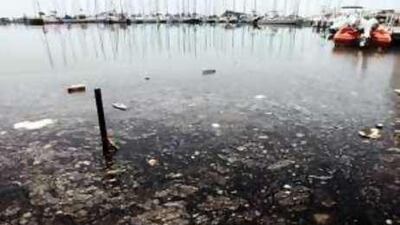DUBAI // Gallons of liquid from a fire that destroyed an oil and ghee warehouse has been washed up on some of Dubai's beaches. The brown-black substance surfaced near Dubai Offshore Sailing Club (DOSC), while crews were still fighting Monday's blaze three kilometres away in Al Quoz.
Staff at DOSC were yesterday cleaning the centre's small beach area, while thick layers of the substance lingered in the harbour. Residents in the area, who complained that the substance emitted a foul smell, said patches of brown-coloured water extended several hundred metres from the coast. Mohammed Abdulrahman Hassan, the head of Dubai Municipality's marine environment and wildlife section, said the substance had made its way into the city's storm-drain network and was ultimately piped into the Gulf.
Municipality employees took samples near the resort on Monday. The municipality did not intend to test the samples for toxicity, said Mr Hassan, because officials immediately determined that it was a "harmless" oil product. The effluent was piped to the coast as firefighters doused burning warehouses at the United Foods Company complex. Company officials said ghee, which is used in cooking, and other undisclosed but "highly combustible products" were destroyed in the fire.
Firefighters used water and a fire-extinguishing foam to battle the blaze. The result was a black stream of sludge that flooded the adjacent streets and drainage system. Mr Hassan said: "In this case, we don't see testing as necessary because we know the cause and we know the impact. "But in other cases, when there was sewage, for example, we took samples and analysed [them]." He was referring to an issue in recent years where lorries have illegally dumped human sewage into the city's drainage system. In one particular case, in 2008, bacteria levels off the coast near DOSC reached near-toxic levels as a result.
The city runs a separate sewage treatment network, through which effluent from homes and offices are either pumped or transported to a sewage-treatment plant in Al Aweer. The treated water is then used primary to irrigate green areas in Dubai. But in yesterday's case, which involved the storm-drainage system, Mr Hassan said: "This is cooking oil. We eat it. It will go away with the heat. Yesterday, people were swimming."
Habiba al Marashi, chairman and founder of the Emirates Environmental Group, a non-profit organisation, said high quantities of ghee could damage marine life. She said: "When you have a layer on top of the water, it means it becomes like insulation. "So it could prevent the sun from penetrating the water, and that can have an impact - in that you're depriving the marine life oxygen." Without conducting tests on the material, however, she said: "I don't know what the extent of the damage will be, if there will be any. But again, you don't know what kind of additives are in there. You would need to take it to the lab for testing to see what its contents are."
It is unclear how much of the ghee was piped off the coast. Abdul Majid Sifai, Dubai Municipality's head of drainage and irrigation and network, said it was not known how much oil, fat, ash and hose water were released into the sea, but stressed it was "not that big". "Because of the fire, it turns a blackish colour, but it's mostly fire water," he said. One of the "negative side effects" of storm-drain networks was that they do not discriminate between run-off and potentially hazardous water that enters, he said.
"You can predict things, but if there is a sudden fire like this one early in the morning, it's not always the case," he said. "Maybe the firefighters didn't know. Unfortunately, with this system, what drains in that area will dump to the sea." Some people believed the amount piped into the sea was significant. Hynnes Stewart, a 54-year-old South African tax lawyer, and a member of DOSC, who kayaked yesterday morning into the layer of sludge said: "It was a pretty solid line of discolouration. From the beach for a couple of hundred yards into the ocean there was a line of a brown colour. To me it looked like a substantial amount."
Later, when he arrived home, he said he "noticed on the floor a trail of black marks. I must have stepped into some oil; it was like stepping in chewing gum". He added: "Hearing that it's oil-related, as bad as it is, it's slight relief - I prefer paddling in oil than sewage. I just thought to myself, 'Crikey, the whole sewage thing is back again'." @Email:hnaylor@thenational.ae

